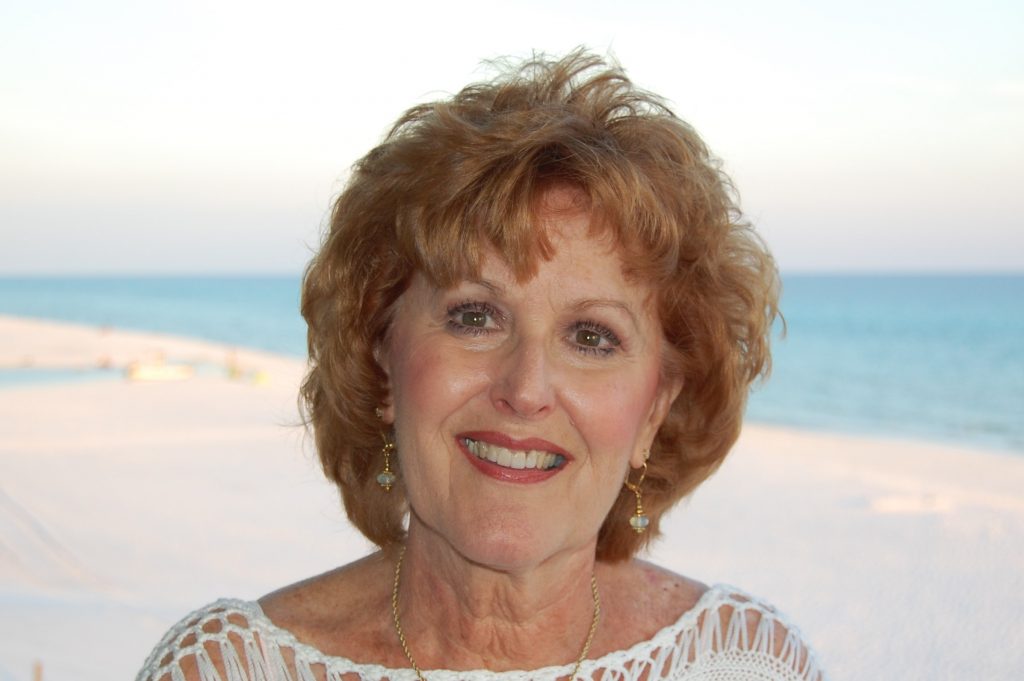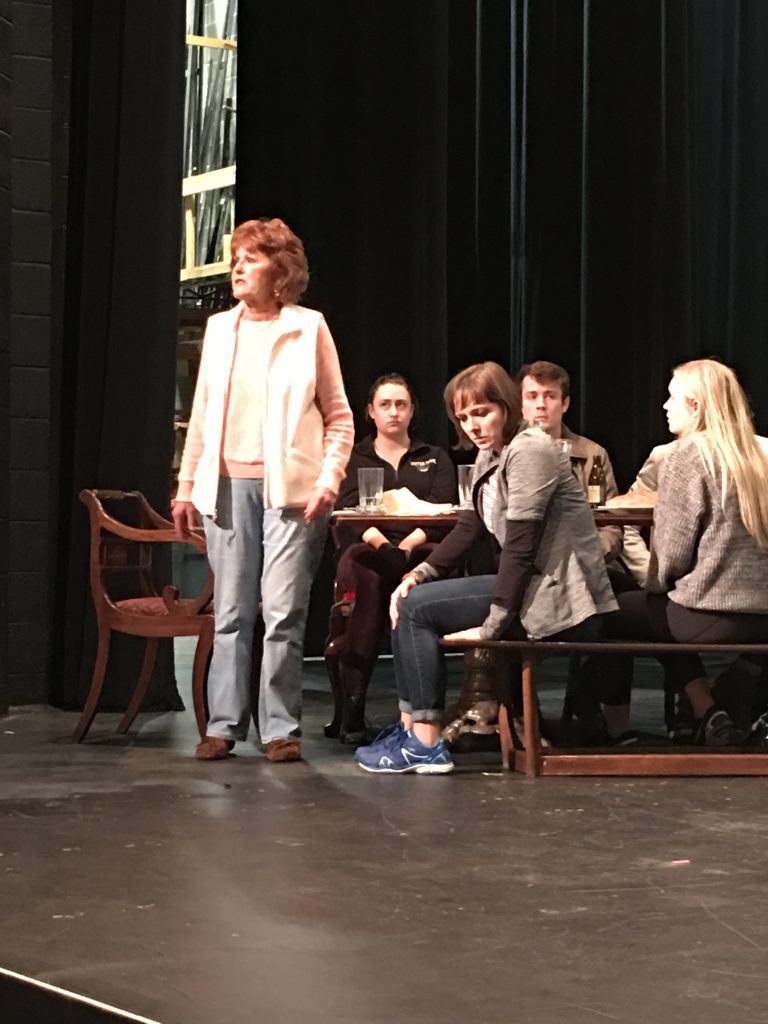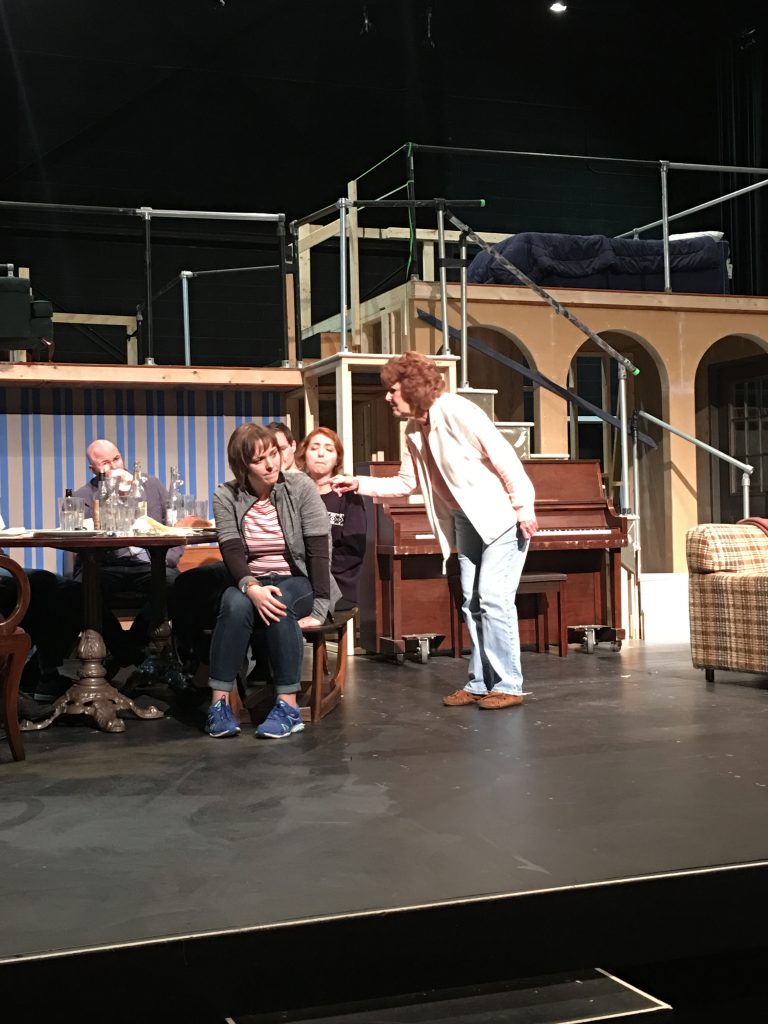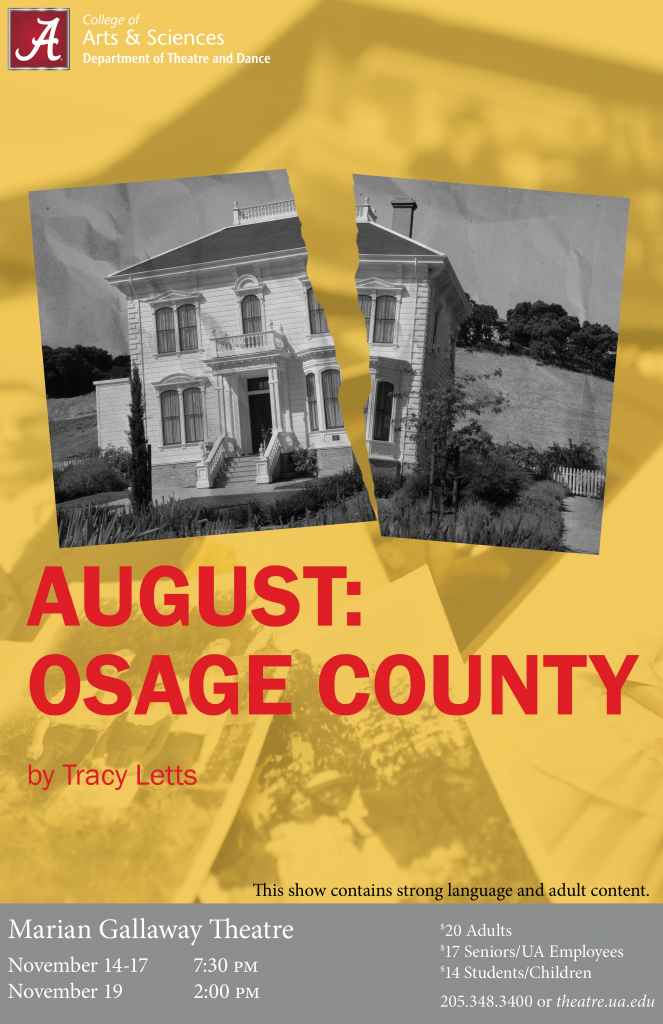By Nathaniel P. Reid
There is a house sitting alone on the windswept plains of Osage County, Oklahoma. Dwelling in that house is a woman comprised of equal parts venom and vigor and her name is Violet Weston. Wife, sister, or mother to most of the characters in Tracy Letts’ slice-of-life drama August: Osage County, Violet is an intense character of many layers and tackling the role is no small feat. When it came to who would play this part in UA Theatre & Dance’s production, Director Stacy Alley was enthusiastic to welcome back to the stage a frequent and favorite guest star, Dianne Teague.
 A founding member of The Licklog Players, a community theatre group in Hayesville, NC, the Tuscaloosa actress has fond memories of those early years. “We were young and wildly ambitious,” said Teague “doing musicals, dramas, new scripts, revues, and dinner theatre and also a little bit of touring.” After moving to Tuscaloosa with her husband Bill, she set about completing her BA in Theatre at The University of Alabama where she auditioned for her first departmental production. “When we came to UA, it seemed natural for me to audition and I was cast as Mrs. Kendal in The Elephant Man during my first semester. Since then, I’ve done 20-30 shows here.”
A founding member of The Licklog Players, a community theatre group in Hayesville, NC, the Tuscaloosa actress has fond memories of those early years. “We were young and wildly ambitious,” said Teague “doing musicals, dramas, new scripts, revues, and dinner theatre and also a little bit of touring.” After moving to Tuscaloosa with her husband Bill, she set about completing her BA in Theatre at The University of Alabama where she auditioned for her first departmental production. “When we came to UA, it seemed natural for me to audition and I was cast as Mrs. Kendal in The Elephant Man during my first semester. Since then, I’ve done 20-30 shows here.”
Many people had a strong influence on shaping Teague into the artist she is today. “I had an excellent acting teacher at UA, Brad Myers,” said Teague, looking back. “He really helped me refine and hone my acting skills. Dr. Ed Williams, who directed me in most of my shows here – from Shakespeare and Chekhov to Horton Foote – taught me about ‘the world of the play’ that we as actors must inhabit in order to make it a reality for our audience. Also my husband, Bill Teague, whose lighting has created some of the most beautiful and evocative environments in which I’ve ever appeared. Bill taught me how to ‘find my light’.”
 Working with Alley and the cast of current UA Theatre & Dance students has been a treat for Teague. “Stacy has put together a powerful cast that responds quickly and eagerly to her direction,” Teague said. “She finds a way to communicate with each actor in the way that actor needs. Our backstage crew is just terrific with a staggering prop situation! I don’t know how they do it. It’s a joy to work with all these folks.” She also has advice for future Theatre professionals: “Work hard and don’t think talent alone is enough. Pay attention to what other actors are doing that works and learn from them. Theatre is not for the faint of heart.”
Working with Alley and the cast of current UA Theatre & Dance students has been a treat for Teague. “Stacy has put together a powerful cast that responds quickly and eagerly to her direction,” Teague said. “She finds a way to communicate with each actor in the way that actor needs. Our backstage crew is just terrific with a staggering prop situation! I don’t know how they do it. It’s a joy to work with all these folks.” She also has advice for future Theatre professionals: “Work hard and don’t think talent alone is enough. Pay attention to what other actors are doing that works and learn from them. Theatre is not for the faint of heart.”
Diving into a character as deep as Violet Weston doesn’t faze Teague, whose training allows her to trust that Letts has provided the essentials to navigate her character arc “I’m not much for talking about process,” confessed Teague. “Basically, I believe all the answers lie in the text/script. It’s all there! I was taught Stanislavski Method so I believe we must inhabit the character we are shaping, not just mouth the words, and the character is revealed to us through the script.”
 Letts’ script has revealed many things about the trauma that shaped Teague’s character. “Violet is a complex and volatile character.” Teague explained. “She’s very guarded with her affections, although I believe they run deep. But repeated betrayals and abuse by her own mother have left her imprisoned in an armor of self-protective viciousness that prevents her from being open or generous with her love. She always wants to be ahead of the game. A repeated phrase is ‘Nobody slips anything by me.’”
Letts’ script has revealed many things about the trauma that shaped Teague’s character. “Violet is a complex and volatile character.” Teague explained. “She’s very guarded with her affections, although I believe they run deep. But repeated betrayals and abuse by her own mother have left her imprisoned in an armor of self-protective viciousness that prevents her from being open or generous with her love. She always wants to be ahead of the game. A repeated phrase is ‘Nobody slips anything by me.’”
Violet is not without her humanizing moments. “Violet is opening up (a rare moment) to her grown daughters,” said Teague about her favorite moment in the show “about a boy she had a crush on when she was a young girl. She is totally without her protective armor in that scene and we catch a glimpse of her vulnerability and innocence that was laid to waste in her childhood and youth.” The audience has a lot to chew on with the feast of plots intertwining in the production. “This show demands a lot of an audience because it is richly detailed storytelling.” Teague said.
“There are multiple life stories unfolding and there’s a crisis for everyone! But the payoff, if we do our job, is that the audience will be transported into the “world of the play” and for a little while they will be with us there in Osage County, Oklahoma.”
August: Osage County runs November 14-17 & 19 in the Marian Gallaway Theatre on The University of Alabama campus. Tickets are $20 for adults, $17 for Faculty/Staff/Seniors and $14 for students, available in Rowand-Johnson Hall at the ticket office, by phone at 205.348.3400 or online at ua.tix.com. More information on this production and the rest of the UA Theatre & Dance season can be found at theatre.ua.edu.
